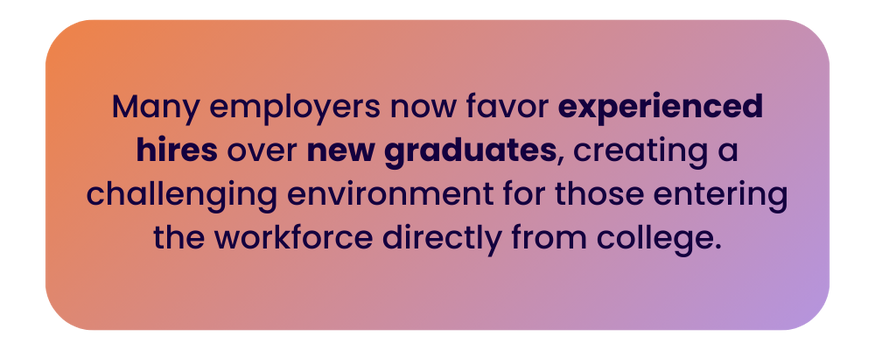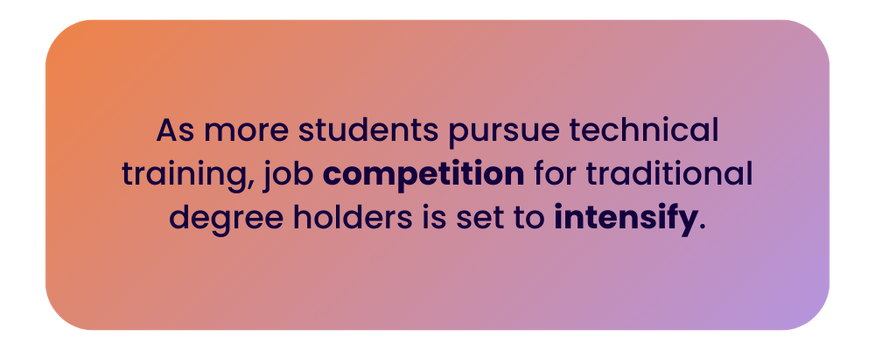2024 Election Results: What a Republican Administration Means for the College Labor Market




With the 2024 election results in, a Republican administration is set to bring notable changes to higher education and the college labor market. From shifting hiring trends to new pathways for job candidates, the evolving landscape will impact both graduates and educational institutions alike.
Unemployment for recent bachelor’s graduates has climbed above 12%, a sharp rise from last year. While the national unemployment rate remains low at 4%, the college labor market faces unique pressures. Many employers now favor experienced hires over new graduates, creating a challenging environment for those entering the workforce directly from college.

Adding to the competition, layoffs this year have been substantial. In 2024, 493 tech companies laid off over 143,000 employees, with states like California, Texas, New Jersey, and New York experiencing the most significant job cuts. While layoffs spiked mid-year, recent data shows stabilization, suggesting that job competition may ease slightly for students in these areas. However, with so many experienced workers now seeking employment, entry-level candidates still face an uphill battle.
As a new Republican administration steps in, it has signaled plans to change higher education policy. These proposed changes focus on reducing education costs and expanding access to technical training and non-degree programs. While this may benefit some students by creating alternative career paths, it could also intensify job competition for bachelor’s and master’s graduates as more candidates with specific technical skills enter the job market. Employers facing budget constraints may increasingly turn to candidates with associate’s degrees or certifications over those with traditional four-year degrees.
Meanwhile, tech talent remains in high demand, especially in fields like artificial intelligence (AI), which pushes wages higher across industries. Employers face a balancing act—managing rising wage expectations while staying within budget. This environment is driving many companies to explore hiring from community colleges and technical programs to fill these roles at a lower cost, shifting hiring dynamics and altering traditional expectations for entry-level roles.
Industry-wide trends mirror these shifts. A recent survey from the Collegiate Employment Research Institute (CERI) indicates that more organizations actively seek candidates with specific credentials and certifications, regardless of whether they hold a degree. This trend is likely to accelerate, creating both challenges and opportunities for recent graduates navigating an increasingly competitive job market.
At 12twenty, we additionally observe these changes across community colleges and vocational programs. Many institutions are adapting to these demands by integrating more sophisticated career management systems, implementing alumni mentoring programs, and enhancing outcomes reporting—features typically seen at four-year institutions. As career paths continue to diversify, transparency in outcomes and measurable returns on investment for educational programs are becoming essential. Both education providers and students need clarity on the value of different educational pathways in terms of career outcomes.
These trends point to a larger transformation in the college labor market. As traditional degrees and alternative credentials increasingly overlap, career services and educational institutions must evolve to meet changing employer expectations. For institutions aiming to stay competitive, helping students build adaptable skills and demonstrating measurable value to stakeholders are critical. In this environment, institutions that can equip students with both flexible career paths and concrete skills will stand out, ultimately benefiting both graduates and the employers who hire them.

At 12twenty, we additionally observe these changes across community colleges and vocational programs. Many institutions are adapting to these demands by integrating more sophisticated career management systems, implementing alumni mentoring programs, and enhancing outcomes reporting—features typically seen at four-year institutions. As career paths continue to diversify, transparency in outcomes and measurable returns on investment for educational programs are becoming essential. Both education providers and students need clarity on the value of different educational pathways in terms of career outcomes.
These trends point to a larger transformation in the college labor market. As traditional degrees and alternative credentials increasingly overlap, career services and educational institutions must evolve to meet changing employer expectations. For institutions aiming to stay competitive, helping students build adaptable skills and demonstrating measurable value to stakeholders are critical. In this environment, institutions that can equip students with both flexible career paths and concrete skills will stand out, ultimately benefiting both graduates and the employers who hire them.